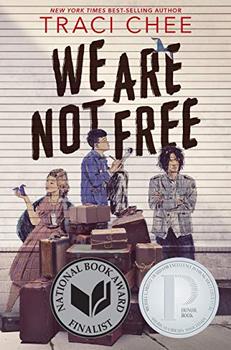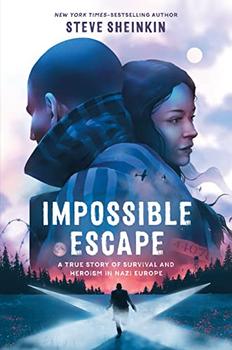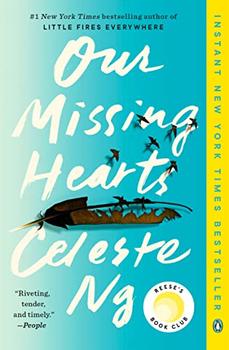Summary | Excerpt | Reading Guide | Reviews | Beyond the book | Read-Alikes | Genres & Themes | Author Bio

Critics' Opinion:
Readers' Opinion:
First Published:
Sep 2020, 400 pages
Paperback:
Mar 2022, 400 pages
 Book Reviewed by:
Book Reviewed by:
Catherine M Andronik
Buy This Book
Author Traci Chee is best known for her young adult fantasy trilogy, The Reader series. We Are Not Free is a complete departure from that genre, with a setting and characters close to her heart and history. In this novel, which begins in 1942, 14 Japanese American teenagers are ripped from their lives in San Francisco and relocated to detention camps scattered across the western United States. Chee draws on the experiences of her own grandparents to recreate events and bring to vivid life characters with a wide range of personalities and versions of the broken American dream.
The novel employs 14 points of view — eight boys and six girls. Chee is up to the challenge of keeping the voices distinct. There is the artistic Minnow and his solid-as-a-rock older brother Mas, hyperactive Twitchy, angry poet Tommy, musical Yum-Yum, blonde-wigged Bette. These 14 points of view also permit the author to explore a variety of possible outcomes for the teens. Initially, all are temporarily relocated from their homes in a tight-knit San Francisco neighborhood to the nearby Tanforan racetrack, where they are housed in horse stalls. The next three years find them scattered around the country, and even abroad, yet still faithfully keeping in touch.
From Tanforan, the teens and their families are sent to barracks at the Topaz Detention Center in central Utah. Young people at Topaz attend school and play sports, but the barbed wire surrounding the camp never allows them to forget that they are incarcerated. One man is shot for standing too close to the fence, a scene Chee describes in heartbreaking detail. Since some of the teens at Topaz are of age to enlist and are U.S. citizens, they are given the option of volunteering to join the armed forces — with an all-Japanese unit. Mas and Twitchy join up, are sent for training, and soon are posting letters from the Western front — Italy, France, always places where the fighting is the most fierce and deadly. One of these young men returns to his loved ones. Another, though fortunate to have a friend nearby in his final moments, does not.
An alternative destination arises from a questionnaire given to the residents of Topaz and other detention centers relating to citizenship. Nisei — the Japanese language term for young people born in the United States to parents from Japan — were U.S. citizens. Issei — the term for immigrants born in Japan — were legally denied American citizenship. On the questionnaire, detainees were asked whether they would renounce allegiance to any country or government other than the United States. For Issei, answering "yes" rendered them stateless. In We Are Not Free, the Katsumoto family is disheartened by the questionnaire. After the bombing of Pearl Harbor, Mr. Katsumoto, a grocer, had placed "We Are American" posters in the windows of his San Francisco shop. His children, Stan and Mary, were model American students. The question breaks his trust in his chosen homeland.
Tommy Harano and his family are in a similar situation. Tommy longs for his parents to see him, love him, accept him as he is, but they only want him to conform to their perception of what a good, traditional Japanese son should be. He renounces the United States and gains their approval. Some of the adults who answer "no" to the controversial question consider returning to Japan, a country at war, a country they have not seen for decades. In the meantime, families like the Katsumotos and the Haranos are sent from Topaz to another detention center, Tule Lake, on the northern border of California. And, from Tule Lake, the teens continue to correspond with their friends in Utah and Europe.
There was yet another alternative, which Traci Chee explores with two of her young characters. Nisei deemed "loyal" by the United States have the option of taking a job in the Midwest or on the East Coast — far from California and its relative proximity to Japan. Bette (she of the blonde wig) and quietly rebellious Shigeo leave their families in Topaz and find apartments and jobs in Chicago and New York City for the duration of World War II — as always, consistently keeping in touch with their friends.
Some novels are plot-driven, others character-driven; We Are Not Free is situation driven. For teen readers already familiar with Farewell to Manzanar, They Called Us Enemy, and Baseball Saved Us, Traci Chee offers a wider, multifaceted picture of this shameful episode in America's past with a more individual focus.
![]() This review was originally published in The BookBrowse Review in September 2020, and has been updated for the
March 2022 edition.
Click here to go to this issue.
This review was originally published in The BookBrowse Review in September 2020, and has been updated for the
March 2022 edition.
Click here to go to this issue.

If you liked We Are Not Free, try these:

by Steve Sheinkin
Published 2023
From three-time National Book Award finalist and Newbery Honor author Steve Sheinkin, a true story of two Jewish teenagers racing against time during the Holocaust - one in hiding in Hungary, and the other in Auschwitz, plotting escape.

by Celeste Ng
Published 2023
From the #1 bestselling author of Little Fires Everywhere, comes one of the most highly anticipated books of the year – the inspiring new novel about a mother's unbreakable love in a world consumed by fear.





The House on Biscayne Bay
by Chanel Cleeton
As death stalks a gothic mansion in Miami, the lives of two women intertwine as the past and present collide.

The Flower Sisters
by Michelle Collins Anderson
From the new Fannie Flagg of the Ozarks, a richly-woven story of family, forgiveness, and reinvention.

The Funeral Cryer by Wenyan Lu
Debut novelist Wenyan Lu brings us this witty yet profound story about one woman's midlife reawakening in contemporary rural China.
Your guide toexceptional books
BookBrowse seeks out and recommends the best in contemporary fiction and nonfiction—books that not only engage and entertain but also deepen our understanding of ourselves and the world around us.